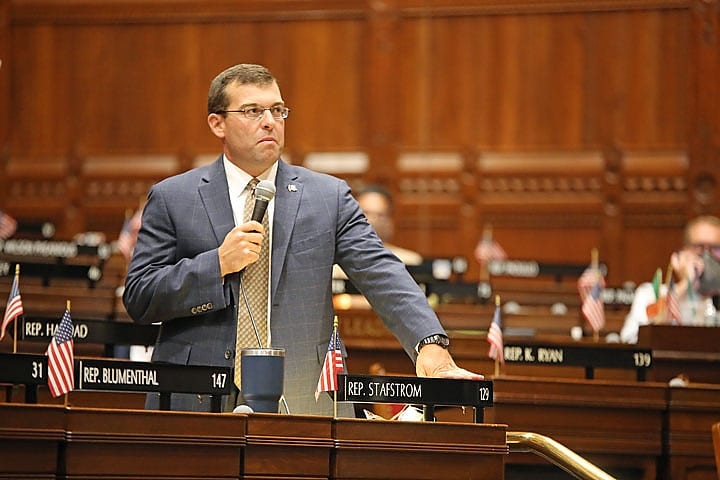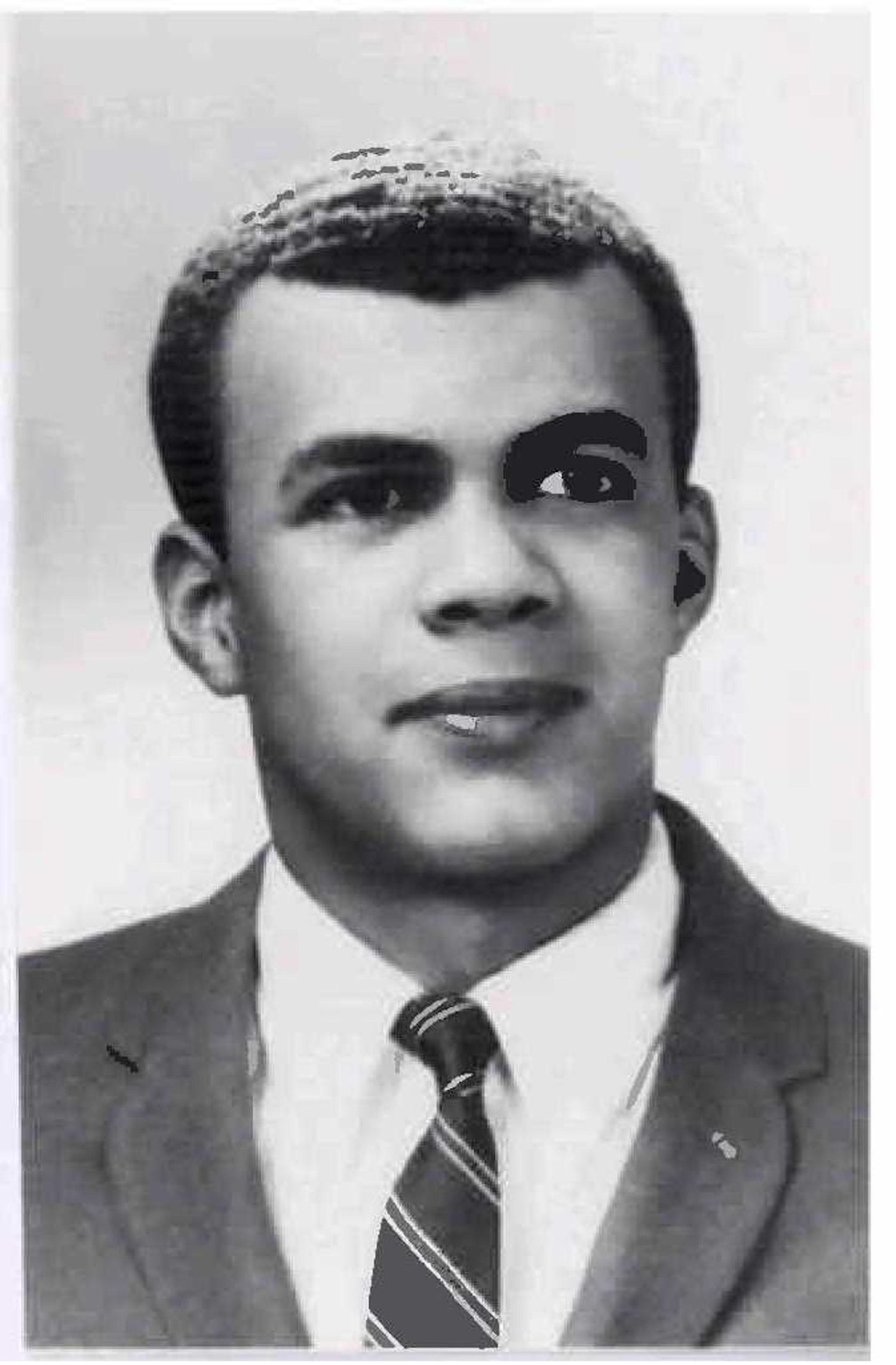House Passes ‘Robust’ Police Accountability Bill

Audio By Carbonatix

State Capitol. Courtesy of CTNewsJunkie.com (we-ha.com file photo)
All three West Hartford representatives, Tammy Exum, Jillian Gilchrest, and Joe Verrengia, voted in favor of the police accountability bill.

Rep. Steve Stafstrom speaks about the police accountability bill. Photo courtesy of CTNewsJunkie.com
By Christine Stuart, CTNewsJunkie.com
West Hartford-specific information provided by Ronni Newton, We-Ha.com
After eight hours of often emotional debate and a tie vote to strike a key provision, the police accountability bill passed the House in special session Friday morning.
The bill includes a provision that would allow citizens to file civil lawsuits against police, eliminating the qualified immunity which protects officers from being sued in state courts.
The bill ultimately passed 86 to 58, but the House debate focused on an amendment to strike the qualified immunity portion of the bill. That amendment failed in a 72-72 tie vote with seven members not voting.
The amendment submitted by Republicans would have taken out Sec. 41 which allows civil lawsuits to move forward against police officers in state court without providing government immunity.
Minutes before the vote on the amendment, House Majority Leader Matt Ritter, D-Hartford, spoke of the annual trips he takes with guys he grew up with, including African-American friends who always call their mother when they arrive at their vacation destination.
“That’s powerful stuff, because it’s a different perspective of how you grew up and what you witnessed,” Ritter said.
Ritter conceded that eliminating immunity was an “uncomfortable change” but he also pointed out that towns already indemnify employees. “There is no new huge flood of cases that could hurt somebody,” Ritter said.
The vote wasn’t easy for members and it wasn’t along party lines. On the key amendment, 18 Democrats joined all but one Republican in voting for the amendment to strip eliminating qualified immunity for officers from the bill.
Joe Verrengia, a Democrat who represents West Hartford’s 20th District and is a retired West Hartford Police officer, voted to remove the qualified immunity amendment. West Hartford’s other two representatives voted to keep it as part of the legislation.
BREAKING: #Connecticut Representatives in the House are voting on an amendment to remove qualified immunity from the police accountability bill. It protects individual officers from civil lawsuits. A Y means they want to remove it. A N is no – keep it in. @NBCConnecticut #NBCCT pic.twitter.com/lsBhMx0WWy
— Jennifer Joas NBC CT (@JenniferJoas) July 24, 2020
“This is the most difficult decision I have ever made in the 12 years I have been in the Chamber,” said Rep. Michelle Cook, D-Torrington who added she has been “sick” for the past 24 hours over the stark divide the bill has created between those who say they support police and those who believe the bill is anti-law enforcement.
Members of the Black and Puerto Rican Caucus and white lawmakers argued against the amendment and leadership allowed the debate to move forward without knowing what the outcome would be.
“We have bad apples and we do not have control over them,” Rep. Anthony Nolan, a Black New London police officer, said.
He said he’s been approached by his fellow officers, but he doesn’t believe families who have lost loved ones can wait.
“Watch who votes. Watch who doesn’t vote because the elections are coming and we heard you. We heard you when you protested. We heard you when you rallied.”
Nolan said they can no longer wait to hold police accountable.
“We need action to speak louder than the words a lot of you said you were against this when you were at the rallies,” Nolan said. “You can help by getting rid of this amendment. You can help by voting on the bill that was presented. You said Black Lives Matter.”
Nolan said they need to help the families be satisfied and have a judgment in the end. He said the municipality already indemnifies officers.
“We you vote, vote with your heart, not your head,” Nolan asked.
Rep. Jillian Gilchrest, D-West Hartford, said the qualified immunity part of the bill is perhaps the most important part.
“Don’t all of us want to prevent a police officer from depriving someone of their equal protection under Connecticut’s laws?” Gilchrest asked. “Section 41 helps us get there.”
She said it’s the municipality and “not the individual officer” who would be responsible to insure that officer, unless the officer engaged in reckless or malicious action.
She said there’s a lot of questions about what Section 41 does.
“You know what it doesn’t do? It doesn’t bring back somebody’s loved one and it doesn’t take away the trauma someone may have experienced at the hands of the police simply because they are Black,” she said. “Section 41 just gives them or their family member one path to seek justice.”
In addition to Gilchrest, West Hartford’s other representatives – Tammy Exum (D-19th), and Verrengia (D-20th) – voted in favor of the police accountability bill.
Rep. Joshua Hall, D-Hartford, said he’s sick of people saying they need more time to debate the issue. He said it’s been going on for hundreds of years.
One of the first bills Hall spoke about in 2017 was a police accountability bill, which was debated, but never allowed to come to a vote.
“The systems that are in place are there to protect the police officers,” Hall said.
The bill was a robust one, according to the proponents.
“It responds not just to an incident that happened in Minnesota. The murder of a man. But as I’m sure we will hear tonight. It also is about stories, issues and concerns here in our home state,” Rep. Steve Stafstrom, D-Bridgeport, said.
Stafstrom said the bill creates an Office of Inspector General to investigate deadly use of force cases. It also allows municipalities to create their own citizen review boards.
“The bill before us is not anti-cop,” Stafstrom said. “We understand that change is hard, but often times change is also necessary.”
Rep. Rosa Rebimbas, R-Naugatuck, said despite their best efforts they were unable to reach a bipartisan consensus on the legislation.
Leaders in the House decided to put the bill on the board even though they didn’t know if it would pass.
Typically, a bill doesn’t go on the board for a vote unless the outcome is predetermined.
“Sometimes you’ve got to let democracy exist out on that floor,” Ritter said before the start of the debate. “There’s just some issues that a governor, a speaker, a majority leader can’t always resolve and that’s not a sign of the weakness of leadership. That’s a sign of the difficulty of the issue.”
Deciding how police should be held accountable for misconduct has proved difficult for lawmakers, who are struggling with misinformation about the legislation that was still being negotiated late into the night.
Ritter said even if one or two sections of the bill were removed he would still vote for the bill because “it does really good policy.”
Although the bill was controversial for some of his members, Ritter said he trusted all of his members to talk to their constituents and listen to the debate before voting on the issue.
House Minority Leader Themis Klarides, R-Derby, said there’s not going to be one officer after this passes who isn’t going to go out and get their own personal liability insurance.
“This is the etching away of qualified immunity,” Klarides said.
She said anybody who doesn’t support getting rid of qualified immunity “cannot vote for this bill.”
She said they’ve been at this for four weeks now and “they’re trying to stick a square peg in a round hole.”
Republished with permission from CTNewsJunkie.com, all rights reserved.
Like what you see here? Click here to subscribe to We-Ha’s newsletter so you’ll always be in the know about what’s happening in West Hartford! Click the blue button below to become a supporter of We-Ha.com and our efforts to continue producing quality journalism.




[…] a tax on ammunition, with the revenue going to support gun violence prevention programs. She also supported the recent police accountability legislation that passed earlier this […]